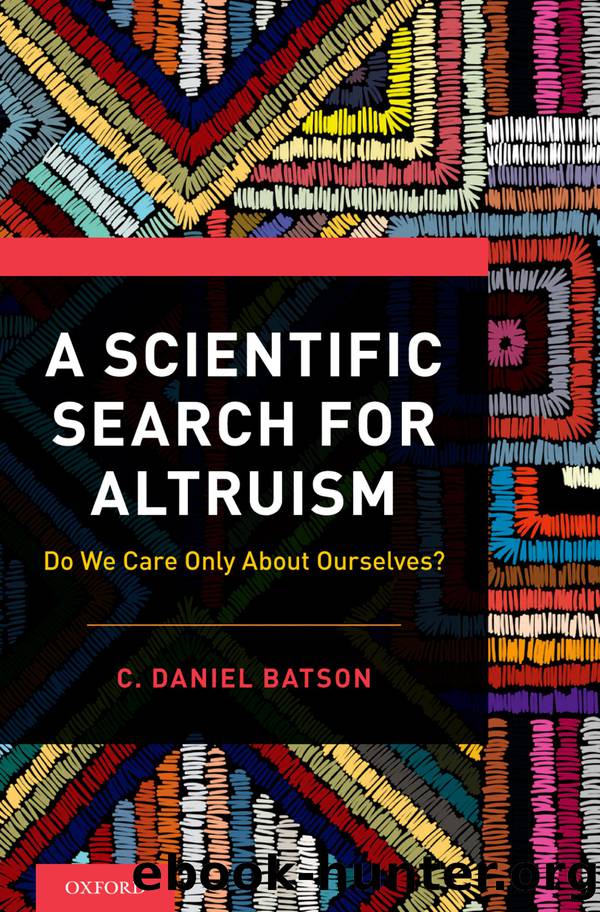A Scientific Search for Altruism by Batson C. Daniel;

Author:Batson, C. Daniel;
Language: eng
Format: epub
Publisher: Oxford University Press, Incorporated
Published: 2019-08-15T00:00:00+00:00
Of Questionable Relevance
Four lines of research fit the category of questionable relevanceâresearch reported by Hornstein, Stürmer, Aron, and Davis:
Hornstein. In support of his version of selfâother identification, Harvey Hornstein cited his own and othersâ research showing that people are more likely to provide anonymous help to a stranger (by, for example, mailing a lost letter or returning a lost wallet) when they know that the stranger agrees with their opinions, shares their values, or is a member of their national or ethnic group (Hornstein, 1978). Unfortunately, no measures of empathic concern or selfâother merging were taken in this research, so weâre left in the dark regarding what produced these effects. Was it other-oriented empathic emotion? Selfâother merging? Promotion of the helperâs own values? Liking? Obligation? What?
Turner cited this same research as a primary basis for his claim that group-level self-categorization produces perception of myself and my fellow group members as interchangeable exemplars with an identity of interests. However, the research provided no clearer support for Turnerâs form of merging than Hornsteinâs.
Stürmer. Stefan Stürmer and colleagues reported four different studies in which some participants could help an in-group member and others could help an out-group member (Stürmer, Snyder, Kropp, & Seim, 2006; Stürmer, Snyder, & Omoto, 2005). For example, in one study German and Muslim university students in Keil, Germany, were given a chance to help a German or a Muslim student find a place to live. Stürmer and his colleagues measured empathy and consistently found an empathyâhelping relationship when participants could help an in-group member, but the empathyâhelping relationship was weak or nonexistent when the person needing help was from the out-group. Relating these findings to Turnerâs ideas, Stürmer and colleagues suggested that self-interest was expressed at the group levelâinterest in Us (in-group members) but not Them (out-group members).
I donât think these findings supported Turnerâs view. From Turnerâs perspective, and from the perspective of each of the other merging models, there should be an in-groupâout-group difference in both empathy and helping. Participants confronted with an in-group member in need should feel more empathic concern and be more likely to help than those confronted with an out-group member. Yet Stürmer and his colleagues didnât find either of these differences in any of their studies. Participants were no less likely to feel for or to help an out-group person than an in-group person.
But then, why wasnât an empathyâhelping relationship found for out-group helping? Its absence seemed most likely due to the overriding effect of other factors that can affect out-group helping. We may lack confidence that we know what needs to be done or know how to do it. We may worry that weâll look patronizing if we help or prejudiced if we donât, and so on. One or more of these factors could easily have obscured the empathyâhelping relationship when the person in need was an out-group member.
Aron. Art Aron and his colleagues found that people are slower to report whether or not they have a trait when they and a close other (e.
Download
This site does not store any files on its server. We only index and link to content provided by other sites. Please contact the content providers to delete copyright contents if any and email us, we'll remove relevant links or contents immediately.
Overcoming ADHD Without Medication : A Guidebook for Parents and Teachers by Children and Natural Psychology Association for Youth; Children The Association for Youth(751)
Out of the Mainstream: Helping the Children of Parents with a Mental Illness by Loshak Rosemary;(743)
Depression by Adams Media(693)
The Noom Mindset by Noom(516)
Delphi Collected Works of Sigmund Freud (Illustrated) by Sigmund Freud(497)
The Psychology of Media and Politics by George Comstock & Erica Scharrer(428)
MANIPULATION & MIND CONTROL: The Persuasion Collection: Dark Psychology Secrets, Analyze & Influence People with Nlp. How to learn Reading Friends and Develop Body Language Skills. by ROBERT TOWER(416)
The 48 Laws of Mental Power: Overcoming Trauma and Building Mental Strength by Victor O. Carl(380)
It's nobody's fault: new hope and help for difficult children and their parents by Harold Koplewicz(373)
Behold the Monster by Jillian Lauren(373)
Directions in Technical Writing and Communication by Gould Jay R.;(367)
The Hypnotic Coach: A Conversational Hypnotherapy Tool Kit by Marion Jess(360)
Sigmund Freud by Janet Sayers;(330)
THE PSYCHOLOGY OF ENTREPRENEURSHIP; New Perspectives by Michael M. Gielnik; Melissa S. Cardon; Michael Frese(317)
Positive Psychology Across the Lifespan; An Existential Perspective by Piers Worth(314)
Mastering Flow: Perform Better, Experience More Joy, and Live a Happier Life by Nils Salzgeber(309)
The Modern Young Man's Guide to Manhood by Wayne Walker(305)
Mind Hacking Secrets and Unlimited Memory Power: 2 Books in 1: Learn How to Improve Your Memory & Develop Fast, Clear Thinking in 2 Weeks + 42 Brain Training Techniques & Memory Improvement Exercises by Sharp Scott(305)
Secrets of the Autistic Millionaire: Everything I know about Autism, ASD, and Asperger's that I wish I'd known back then... by David William Plummer(287)
